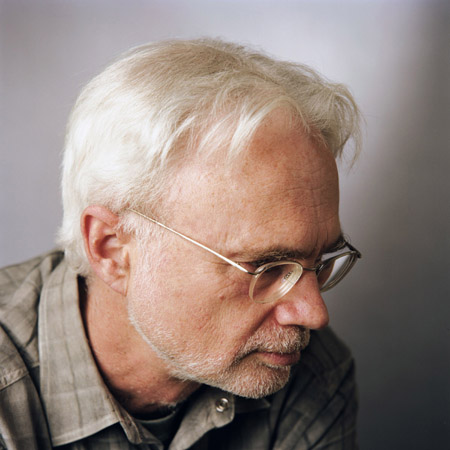John Adams's 2005 opera Doctor Atomic received its Met premiere last week. The opera tells the story of the creation of the atomic bomb and the man behind it, J. Robert Oppenheimer. New York magazine says that "Adams has written his finest work" with this "darkly riveting" opera and its "score of microscopic clarity and panoramic sweep." The Star-Ledger praises conductor Alan Gilbert, who "led a performance of precision and expressiveness, bringing the score's harmonic piquancy, metrical complexity, and textural detail together as a visceral rush." The Washington Post says one of the opera's "moments of rich beauty" is the duet between Oppenheimer and his wife, in which "the score is so purely gorgeous it could make you cry."
John Adams's 2005 opera Doctor Atomic received its Metropolitan Opera premiere last week with a new staging by British film direction Penny Woolcock (The Death of Klinghoffer, 2003), and continues with further performances through early November. The opera tells the story of the creation of the atomic bomb and the man behind the project, J. Robert Oppenheimer.
New York magazine's Justin Davidson says that, with the "darkly riveting" Doctor Atomic, "Adams has written his finest work." The premiere of the opera's first production, directed by its librettist, Peter Sellars, at the San Francisco Opera House in 2005, left Davidson "bewitched."
Of the new production, the writer lauds conductor Alan Gilbert, making his Met debut, and his "gift for seeing the lucid core in mountains of complex detail," through which "he reveals a score of microscopic clarity and panoramic sweep."
Davidson's admiration for Adams's compositional skills is such that he imagines "Adams could set a Chinese-takeout menu to music without sacrificing lyric fluency." Much grander than that text is John Donne's poem "Batter My Heart," which Gerald Finley sings as Oppenheimer, "set to music that recalls a lament by Henry Purcell. The melody sighs, slides, and recovers by leaps, only to roll back gently into exalted gloom. This is the opera’s hit single, and its power comes from sweeping away the cluttered rattle of building, calculating, fretting, and arguing."
For more, visit nymag.com.
---
The Star-Ledger's Bradley Bambarger calls Doctor Atomic "an elegy on the end of American innocence," one that "has struck a chord exceedingly rare for a contemporary opera, even considering Adams' standing as the nation's signature composer."
With all the technical complexities of the new staging, Bambarger asserts, "the true special effect is Adams' kaleidoscopic orchestration." He adds to the praise of Maestro Gilbert, who "led a performance of precision and expressiveness, bringing the score's harmonic piquancy, metrical complexity and textural detail together as a visceral rush."
Bambarger too points to Oppenheimer's aria as a high point, sung "to music that beseeches like a Bach cantata, the scientist reaching for the spiritual to no avail." He also praises the duet between Oppenheimer and his wife, Kitty, as "desperately romantic, their voices entwining and separating like hands unable to hold on."
Read the review at nj.com.
---
The New Yorker's classical music critic Alex Ross has been familiar with Doctor Atomic since before its premiere at the San Francisco Opera House in 2005. Having attended rehearsals for that production, Ross writes now, in his review of the Met's production, that those rehearsals "revealed Atomic to be not only an ominous score but also an uncommonly beautiful one. Scene after scene glows with strange energy." He continues:
There is an inexplicably lovely choral ode to the bomb’s thirty-two-pointed explosive shell, with unison female voices floating above lush string-and-wind chords and glitterings of chimes and celesta. J. Robert Oppenheimer, the leader of the atomic project, and Kitty, his brilliant, alcoholic wife, sing sumptuous duets over an orchestra steeped in the decadent glamour of Wagner and Debussy. Oppenheimer’s central aria, a setting of the John Donne sonnet “Batter my heart, three-person’d God,” has a stark Renaissance eloquence, its melody a single taut wire. The night of the countdown is taken up with a hallucinatory sequence of convulsive choruses, lurching dances, and truncated lyric flights. After the first run-through with singers and orchestra, it seemed clear that Doctor Atomic was Adams’s most formidable achievement to date.
Ross, while expressing his concerns for the new production based on its first performance, maintains that Gerald Finley as Oppenheimer, a role he created, "seems to have attained vocal greatness in the course of inhabiting the role," and Sasha Cooke, who plays the scientist's wife, creates "a fresh, vital portrayal, bringing a luminous tone, a generously supported musical line, a keen sense of verbal nuance, and a flair for seduction." He describes their duet as "a billowing of sensual delirium into white-knuckle reality."
He has further praise for conductor Alan Gilbert's successful Met debut, having led the orchestra in Adams's score, with its "fiendishly tricky rhythmic passages," so that, "Purely as an experience in sound, the Met’s Atomic was a triumph." Ross concludes: Gilbert won the second-biggest ovation of the evening; the biggest went to Adams, who, twenty-one years after he revolutionized American opera with Nixon in China, finally got to take a bow at a Manhattan opera house."
Read the article at newyorker.com.
---
Washington Post Staff Writer Anne Midgette takes this moment, in which "the music world is in Adams fever"—with the premiere of the new Met production of Doctor Atomic, the arrival of his recently published memoir Hallelujah Junction and the companion two-CD retrospective from Nonesuch of the same name, and the Nonesuch release of his latest opera, A Flowering Tree—to look at the evolution of the composer's music, particularly in his vocals works. Writes Midgette:
Adams's strength is his ability to tap into the familiarity of musical tradition while translating it into a contemporary idiom. This is music born of minimalism, with repeated rapid patterns and blocks of musical event in lieu of straightforward linear development. But if it bears traces of Philip Glass, it is no less influenced by Wagner, whose shadow hovers in the shimmering transformation music of A Flowering Tree ...
She includes among Doctor Atomic's "moments of rich beauty" the duet between Oppenheimer and his wife, in which "the score is so purely gorgeous it could make you cry."
Read more at washingtonpost.com.
---
Los Angeles Times Staff Writer Scott Timberg talks to the composer about the challenges of writing Hallelujah Junction, for which he had little interest in following past examples of the proper composer's memoir. Timberg sees a parallel between this and the Adams's lifework in music:
That sense of having to start at the beginning to forge one's own language is appropriate for an artist like Adams, 61, who fought his way from a comfortable but provincial small-town upbringing to a personal synthesis of American minimalism and European romanticism that has made him among the world's most performed living composers.
Ultimately, Timberg sees the theme of the book as being "driven by an American optimism." Read more at latimes.com.
Writing of the book in Booklist, which contains book reviews from the American Library Association, Alan Hirsch concludes: "It provides enlightening insight into the fertile mind of one of the most important and popular contemporary composers and conductors."
- Log in to post comments



